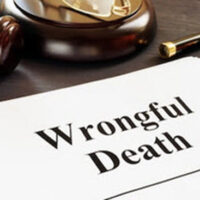What You Should Know About Florida’s Wrongful Death Law

Florida’s wrongful death law ensures that individuals and entities that negligently or wrongfully cause a person’s death will be held liable for their actions. Under the terms of the state’s wrongful death statute, a deceased’s relatives who successfully file a wrongful death claim could be entitled to financial compensation to help pay for medical bills and other accident-related losses. To learn more about filing a wrongful death claim in Florida, please contact one of our experienced Fort Lauderdale wrongful death lawyers today.
Who Can File a Wrongful Death Claim in Florida?
Under Florida law, a wrongful death occurs whenever someone passes away as a result of another person or entity’s:
- Negligence;
- Wrongful act; or
- Violation of contract or warranty.
However, even if decedent’s death qualifies as wrongful under Florida law, a claim can only be filed by the personal representative named in his or her estate plan. If no estate plan is in place, however, the court will appoint a representative who will be tasked with filing a claim on behalf of the decedent’s surviving family members. Relatives who could be entitled to damages if a claim is successful include:
- The deceased’s surviving spouse, children, and parents; and
- Any blood relative or adoptive sibling who was at least partly dependent on the deceased for services and financial support.
There are, however, some exceptions to this rule that apply in medical malpractice cases. If, for example, a healthcare professional or hospital was allegedly responsible for a decedent’s death, only a spouse or minor child will be eligible for wrongful death damages.
Time Limits for Filing a Wrongful Death Claim
In Florida, plaintiffs only have two years from the date of a loved one’s untimely death to file a wrongful death claim on that person’s behalf. In some cases, however, this deadline can be extended. In the case of a medical malpractice fatality, for example, the two year deadline won’t start until the cause of death is discovered, while those whose loved ones passed away as the result of a homicide or other crime could also be eligible for an extension of the statute of limitations. Finally, in cases where a government entity is being accused of causing a wrongful death, the statute of limitations to file a claim will be extended to four years.
Wrongful Death Lawsuit Damages
Only a decedent’s estate, surviving spouse, minor children, or parents are entitled to damages under Florida’s wrongful death law. Furthermore, the specific damages for which these individuals qualify depends on their relationship to the decedent. A surviving spouse, for instance, could recover damages for the loss of his or her partner’s protection and companionship, while a decedent’s minor children could collect damages for the loss of parental guidance and instruction. Other potentially recoverable damages include compensation for: the decedent’s medical and funeral expenses, lost income incurred as a result of the decedent’s death, and emotional distress.
Schedule a Free Consultation Today
To speak with an experienced wrongful death lawyer about your legal options following a loved one’s untimely death, please call the office of Boone & Davis at 954-566-9919 or fill out an online form today.
Resource:
leg.state.fl.us/statutes/index.cfm?App_mode=Display_Statute&URL=0700-0799/0768/Sections/0768.21.html
